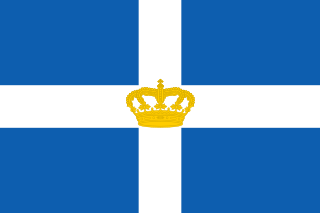 W
WThe Kingdom of Greece was established in 1832 and was the successor state to the First Hellenic Republic. It was internationally recognised by the Treaty of Constantinople, where Greece also secured its full independence from the Ottoman Empire after nearly four centuries.
 W
WThe Macedonian rebellion of 1854 took place in 1854 and is divided into two phases: the first phase took place in Western and Southern Macedonia and the second in Chalkidiki. However, after pressure from the United Kingdom and France on the government of King Otto of Greece, he was forced to recall the chieftain taking part in the rebellions throughout the Greek-inhabited regions of the Ottoman Empire, including Macedonia. The governments of the United Kingdom and France had assumed that the rebellions were related to the Crimean War (1854–1856).
 W
WKarl von Abel was a Bavarian statesman.
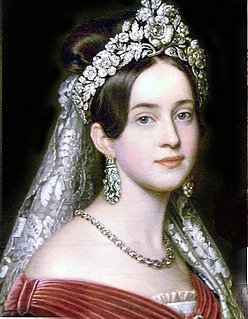 W
WAmalia of Oldenburg was Queen of Greece from 1836 to 1862 as the spouse of King Otto (1815–1867).
 W
WJosef Ludwig, Graf von Armansperg served as the Interior and Finance Minister (1826–1828) and Foreign and Finance Minister (1828–1831) under King Ludwig I of Bavaria in the government of Bavaria. He was a liberal monarchist and an economic conservative who promoted the unification of Germany with his attempts at a tariff union. Later he served as Regent of Greece for the underage Bavarian-born king and as his Prime Minister.
 W
WThe Arta–Volos line or Ambracian–Pagasetic line was the land border of the Kingdom of Greece and the Ottoman Empire between 1832 and the Annexation of Thessaly in 1881. It was named after the two principal cities in proximity of the border on the Ottoman side, Arta and Volos, and the Ambracian Gulf and the Pagasetic Gulf between which it extended.
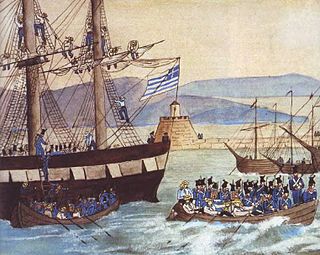 W
WThe Royal Bavarian Auxiliary Corps was a military force formed in 1832 to accompany the Bavarian prince Otto to the newly independent Kingdom of Greece, after he was chosen as the country's first king. As part of the treaty provisions of Otto's accession, a Bavarian-staffed volunteer military corps was to be formed to replace the forces maintained there by the Great Powers—chiefly the French troops of the Morea Expedition—as well as the remnants of the Greek forces organized during the Greek War of Independence, and provide cadres and training for the new Hellenic Army. Because not enough volunteers could be found in time, regular Bavarian Army troops formed much of the actual corps that arrived with Otto in Greece in early 1833. The Bavarian Army regulars were gradually replaced by volunteers until 1834. These came chiefly from Bavaria, but also included men from diverse nations, and often of non-military background. Most of the Bavarians left by 1837, but many remained behind, dominating the Greek army and the administration. This "Bavarocracy" (Βαυαροκρατία), coupled with the huge expenses involved in maintaining the Bavarians, provoked great resentment among the Greeks, and was one of the chief causes of the 3 September 1843 Revolution.
 W
WBaron Konstantinos Bellios or Vellios was a Greek merchant and benefactor from the Ottoman Empire, the modern region of Greek Macedonia.
 W
WDimitrios Christidis was a Greek politician and economist. He served as Speaker of the Hellenic Parliament, Minister of Finance, Minister of Internal Affairs, Minister of Foreign Affairs and Minister of Justice. He was a Senator (1846–1851) and advisor to the State Council established by the Greek Constitution of 1864. He was elected several times as member of Parliament for Syros (1847–1877).
 W
WSir Richard Church was a British military officer in the British Army and commander of the Greek forces during the last stages of the Greek War of Independence after 1827. After Greek independence, he became a general in the Hellenic Army and a member of the Greek Senate.
 W
WTheoklitos Farmakidis was a Greek scholar and journalist. He was a notable figure of the Modern Greek Enlightenment.
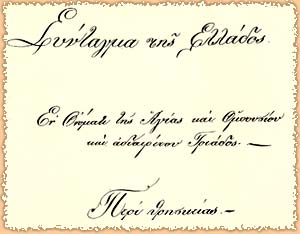 W
WThe first constitution of the Kingdom of Greece was the Greek Constitution of 1844. On 3 September 1843, the military garrison of Athens, with the help of citizens, rebelled and demanded from King Otto the concession of a Constitution.
 W
WThe Greek Volunteer Legion was a volunteer military corps formed by Greeks and other Balkan Christians that fought for the Russian Empire during the Crimean War. It was formed in the Danubian Principalities in March 1854, and some elements participated in the final engagements of the Danube theatre, before the Russian troops abandoned the Principalities. From there the Legion was sent to the Crimea, where it fought in the Siege of Sevastopol. In 1855 the Legion received the title Greek Legion of Emperor Nicholas I. After the end of the siege, the bulk of the Legion was discharged, and the remainder of the unit was disbanded after the war's end in March 1856. Most of the volunteers returned to their homelands, although a few settled in Russia.
 W
WCarl Wilhelm von Heideck was a Bavarian military officer, a philhellene and painter.
 W
WLysandros Kaftanzoglou, was a Greek architect of the 19th century and Chancellor of the National Technical University of Athens.
 W
WDimitrios Kallergis was a fighter of the Greek War of Independence, major general, politician and one of the most important protagonists of the 3 September 1843 Revolution.
 W
WGavriil Antonovich Katakazi was a Russian diplomat and Active Privy Councillor, also notable as the father of Konstantin Katakazi, Russian ambassador to the United States.
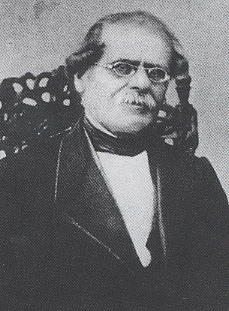 W
WStamatios or Stamatis Kleanthis was a Greek architect.
 W
WTheodoros Kolokotronis was a Greek general and the pre-eminent leader of the Greek War of Independence (1821–1829) against the Ottoman Empire. Kolokotronis's greatest success was the defeat of the Ottoman army under Mahmud Dramali Pasha at the Battle of Dervenakia in 1822. In 1825, he was appointed commander-in-chief of the Greek forces in Peloponnese. Today, Kolokotronis ranks among the most prominent figures in Greece's War of Independence.
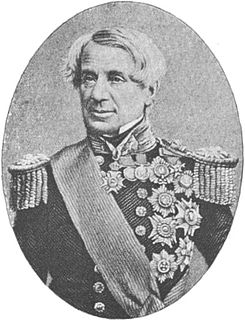 W
WAdmiral Edmund Lyons, 1st Baron Lyons, was an eminent British Admiral of the Royal Navy, and an eminent British diplomat, who was responsible for encouraging the Crimean War, during which he was Commander-in-Chief of the Mediterranean Fleet, and for the securing the subsequent allied victory in the conflict, through his efforts at the Siege of Sevastopol (1854–1855) with both the Navy and the British Army.
 W
WThe Macedonian refugees in Atalanti were a compact population from the Macedonia region, settled in the town of Atalanti after the establishment of the independent Kingdom of Greece.
 W
WYannis Makriyannis, born Ioannis Triantaphyllou, was a Greek merchant, military officer, politician and author, best known today for his Memoirs. Starting from humble origins, he joined the Greek struggle for independence, achieving the rank of general and leading his men to notable victories, most notably the successful defence of Nafplio in the Battle of the Lerna Mills. Following Greek independence, he had a tumultuous public career, playing a prominent part in the granting of the first Constitution of the Kingdom of Greece and later being sentenced to death and pardoned.
 W
WGeorg Ludwig Maurer, since 1831 Georg Ludwig von Maurer was a German statesman and legal historian from the Electoral Palatinate.
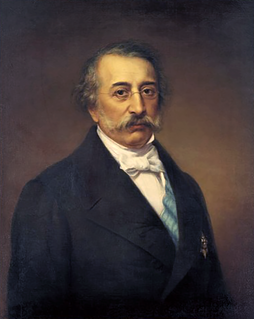 W
WAlexandros Mavrokordatos was a Greek statesman and member of the Mavrocordatos family of Phanariotes.
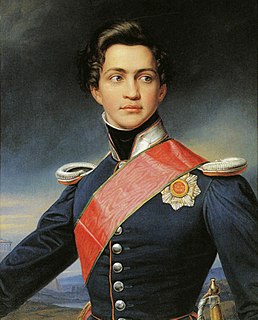 W
WOtto Friedrich Ludwig was a Bavarian prince who ruled as King of Greece from the establishment of the monarchy on 27 May 1832, under the Convention of London, until he was deposed on 23 October 1862.
 W
WAndronikos Paikos was a Macedonian fighter of the Greek Revolution of 1821, university professor, politician, representative in two national assemblies, and minister in three governments.
 W
WAnastasios Polyzoidis was a Greek politician and judicial official.
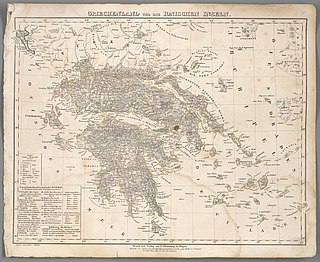 W
WA regency council ruled the Kingdom of Greece in 1833–1835, during the minority of King Otto. The council was appointed by Otto's father, King Ludwig I of Bavaria, and comprised three men: Josef Ludwig von Armansperg, Georg Ludwig von Maurer, and Carl Wilhelm von Heideck. The first period of the regency saw major reforms in administration, including the establishment of an autocephalous Church of Greece. The regency's authoritarianism and distrust of the Greek political parties, especially the Russian Party, which was associated with the period of Governor Ioannis Kapodistrias and was particularly opposed to the Church reforms, led to a quick eroding of its popularity. Armansperg was the council's chairman, but increasingly clashed with the other two regents, who in turn aligned with the French Party under Ioannis Kolettis. The main domestic event of the early period was the arrest and sham trial of Theodoros Kolokotronis, a hero of the Greek War of Independence and the de facto leader of the Russian Party, in 1834. This rallied the opposition against the regency, helped provoke a major uprising in the Mani Peninsula, and fatally undermined the prestige of Maurer and Heideck versus Armansperg. The conflict was resolved in Armansperg's favour in July 1834, when Maurer was replaced by Egid von Kobell. Following Otto's coming of age in June 1835, the council was dissolved, but Armansperg remained in charge of the government as Prime Minister.
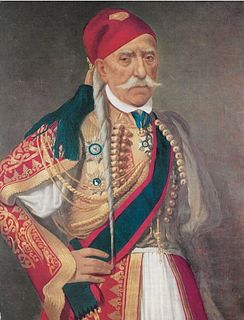 W
WThe Royal Phalanx was a military body composed of veteran officers of the Greek War of Independence, established on 18 September 1835. The Phalanx entailed military garrison duties, but mostly it was an honorific appointment, and a means to sustain veteran soldiers who had no other means of upkeep.
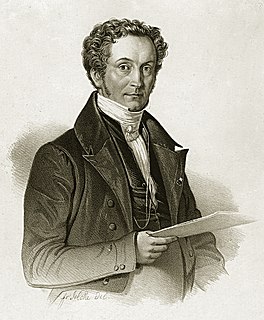 W
WIgnaz Ritter von Rudhart was a Bavarian scholar and public servant who was dispatched to Greece to serve as President of the Privy Council during the reign of King Otto.
 W
WGeorgios Tertsetis was a Greek independence fighter, historian, politician, poet, writer, judge and philosopher. He is best known, along with Anastasios Polyzoidis, for his refusal to agree to the condemnation and execution of Theodoros Kolokotronis and Dimitrios Plapoutas, in 1834.